- Last Updated: January 15th, 2026
Key Takeaways
Seek out attorneys with a strong background in technology law and previous success in cases against large companies like Meta, focusing on their experience with internet safety and privacy.
Check the credentials of potential lawyers by evaluating their trial experience, communication skills, ethical standards, and references from past clients or legal peers.
Schedule consultations early to discuss your lawsuit goals and assess each attorney's experience handling issues similar to what you're facing with Meta platforms.
Where to Find Legal Representation for Your Meta Lawsuit?
On this page, we’ll discuss how to find representation to initiate a Meta Lawsuit, negative youth mental health effects mentioned in the Meta lawsuit, how to file a Meta lawsuit, and much more.
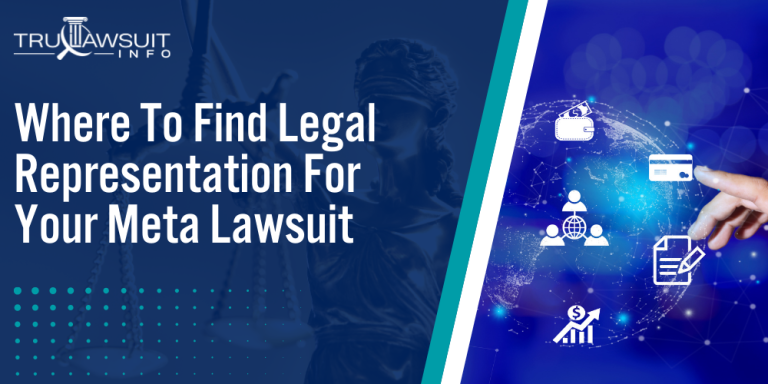
Intro to the Meta Lawsuit
Key issues in the Meta Lawsuit include, but are not limited to:
- The Allegations: At the heart of the lawsuit are claims that Meta failed to protect user privacy and created features that allegedly addict children.
- Monopoly Claims: The Federal Trade Commission (FTC), along with numerous states, is pursuing an antitrust case against Meta, accusing it of gaining and maintaining monopoly power through anti-competitive practices.
- State Involvement: Several attorneys general have joined the legal effort, suggesting a broad consensus on the seriousness of the allegations.
If you or a loved one have experienced mental health issues after prolonged social media usage, you may be eligible to pursue compensation.
Contact TruLawsuit Info for a free consultation, or use the chatbot on this page for a free case evaluation to see if you qualify for potential legal action instantly.
Overview of the Meta Lawsuit
On this page, we’ll provide an overview of the Meta Lawsuit, touching on the deep complexities of data privacy issues, the significant allegations made by a coalition of attorney generals, the ongoing antitrust court case, heavy settlements, and much more.
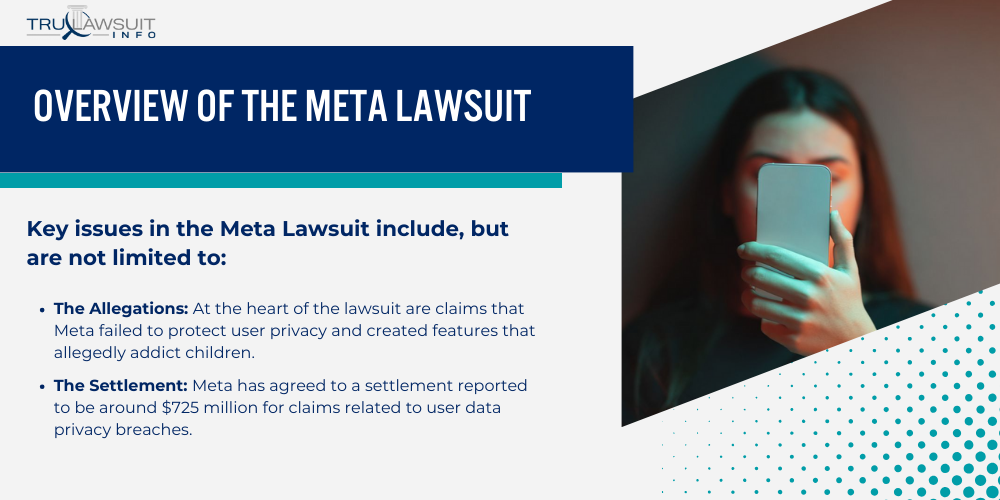
Intro to the Meta Lawsuit
In a prominent legal battle, Meta Platforms Inc. confronts a massive privacy lawsuit with far-reaching implications.
This lawsuit has brought to light a series of controversies surrounding the social media giant, primarily regarding how it handles user data and its competitive business tactics.
Key issues in the Meta Lawsuit include, but are not limited to:
- The Allegations: At the heart of the lawsuit are claims that Meta failed to protect user privacy and created features that allegedly addict children.
- The Settlement: Meta has agreed to a settlement reported to be around $725 million for claims related to user data privacy breaches.
- Monopoly Claims: The Federal Trade Commission (FTC), along with numerous states, is pursuing an antitrust case against Meta, accusing it of gaining and maintaining monopoly power through anti-competitive practices.
- State Involvement: Several attorneys general have joined the legal effort, suggesting a broad consensus on the seriousness of the allegations.
These points offer a concise introduction to the sprawling legal challenges Meta is currently facing.
Understanding the Meta Lawsuit
The Meta lawsuit refers to various legal challenges Meta’s Platforms Inc. faces, involving complex issues surrounding federal and state legislation and the intersection of technological advances and their corresponding legal implications.
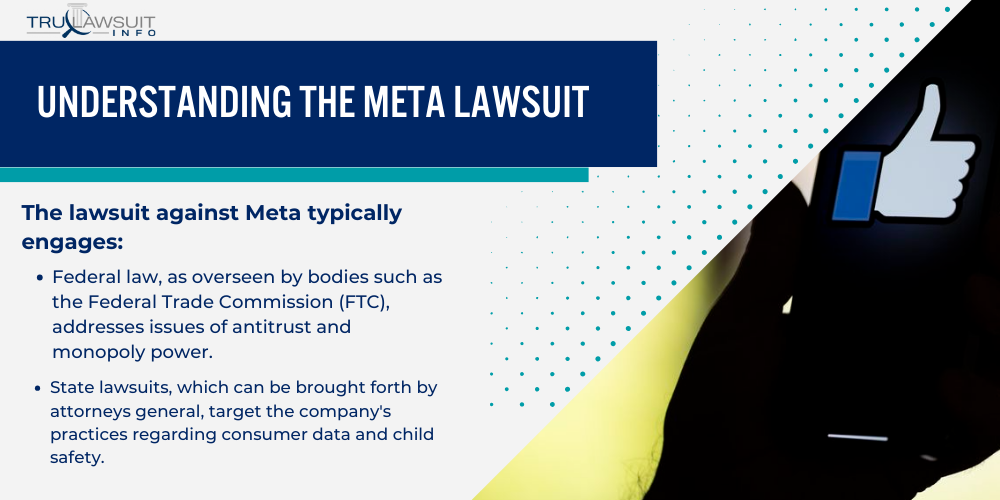
Federal and State Legislation
Federal and state governments have distinct legal frameworks that often intersect over issues like online privacy and consumer protection.
The lawsuit against Meta typically engages:
- Federal law, as overseen by bodies such as the Federal Trade Commission (FTC), addresses issues of antitrust and monopoly power.
- State lawsuits, which can be brought forth by attorneys general, target the company’s practices regarding consumer data and child safety.
- Child safety experts and task forces played an active role in highlighting concerns that necessitated legal action.
There are instances of national-level involvement, such as when the National Center for Missing & Exploited Children collaborates with law enforcement agencies.
Technological Advances and Legal Implications
As Meta continues to push the boundaries of social media and virtual interaction, its innovations frequently serve as a double-edged sword.
This dynamic underscores the intricate balance between advancing technology and adhering to legal standards
Meta’s product development has often led to both sophisticated technology and new legal challenges.
Here are some key aspects:
- Infinite Scroll and other engagement algorithms raise questions regarding online safety and user addiction.
- The role of Meta employees in potential reforms, such as when internal consensus on safety features clashes with executive decisions.
- Coverage by the Wall Street Journal and other media outlets brings public attention to these technological and legal intersections.
- Litigation is processed in both federal court and state courts, where lawsuit claims scrutinize the ramifications of these technological advancements.
Hiring Legal Representation in the Meta Lawsuit
When entangled in a Meta lawsuit, it’s crucial to secure legal representation versed in data privacy issues and experienced with the intricacies of such high-profile cases.
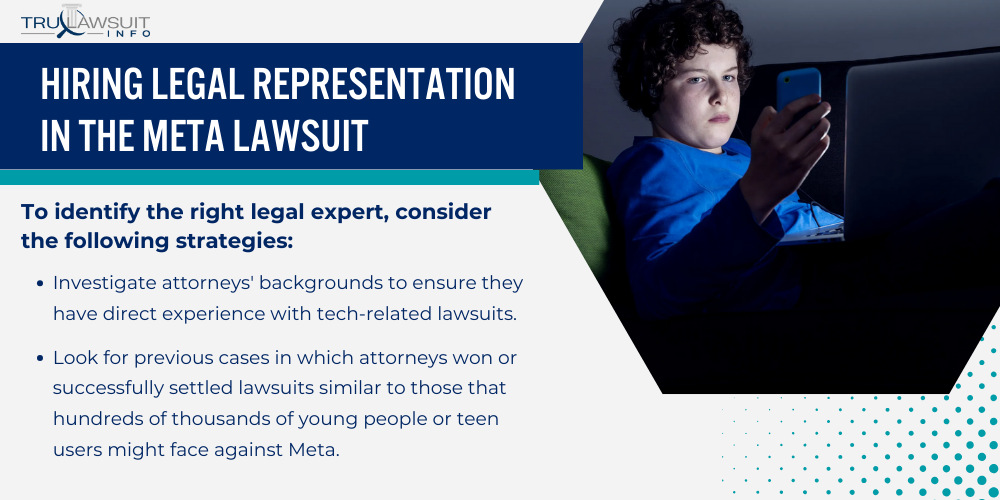
Selecting Specialized Attorneys
Locating an attorney with specialized experience is the first step in mounting an effective legal challenge against Meta.
They should possess a profound understanding of data privacy laws, social media policies, and the specific nuances involved in litigating against large tech companies.
To identify the right legal expert, consider the following strategies:
- Investigate attorneys’ backgrounds to ensure they have direct experience with tech-related lawsuits.
- Look for previous cases in which attorneys won or successfully settled lawsuits similar to those that hundreds of thousands of young people or teen users might face against Meta.
- Check for affiliations with reputable organizations that may add credibility to their practice.
- Verify their standing with local bar associations to confirm they are in good standing and have no history of professional misconduct.
The Role of Non-Profit Organizations
Non-profit organizations can play a pivotal role in providing support and resources in a Meta lawsuit, particularly for younger users and their families who might lack the financial means for private counsel.
To leverage this support effectively, consider the following approaches:
- Seek out organizations such as the National Center for Missing & Exploited Children, which may offer assistance or advocacy for children affected by the impact of social media.
- Consult with local legal aid societies that often have resources or can refer individuals to pro bono legal representation.
- Reach out to Attorneys General offices, as they may have ongoing investigations or actions against Meta that individuals could join.
- Explore community legal clinics, which might provide free workshops or consultations to support teens and their families navigating a Meta lawsuit.
Negative Effects of Social Media Platforms on Youth Mental Health
The use of social media platforms such as Facebook and Instagram has been scrutinized for its potential negative effects on youth mental health, including issues of self-harm, eating disorders, and sexual exploitation.
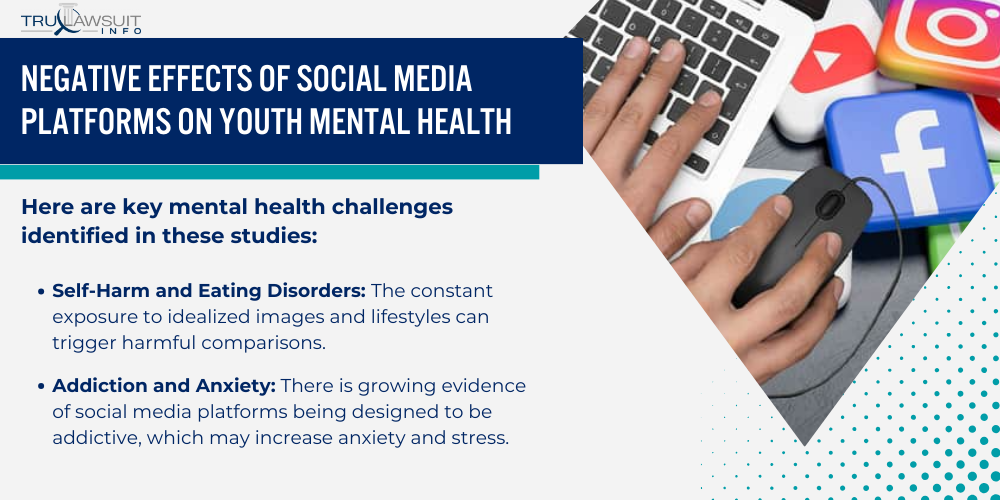
Mental Health Considerations
The pervasive influence of social media on children often leads to serious mental health challenges.
Numerous studies and internal documents from Meta platforms, the parent company of Facebook and Instagram, have shown correlations between social media use and mental health issues among the young population.
Here are key mental health challenges identified in these studies:
- Self-Harm and Eating Disorders: The constant exposure to idealized images and lifestyles can trigger harmful comparisons, body dissatisfaction, and, in severe cases, self-harming behaviors and eating disorders.
- Addiction and Anxiety: There is growing evidence of social media platforms being designed to be addictive, which may increase anxiety and stress.
- Depression and Loneliness: Excessive social media use has been linked to feelings of depression and loneliness as virtual interactions might replace real-life connections.
- Sleep Disturbance: Engaging with social media before bedtime can cause sleep disturbances, further impacting mental health negatively.
Issues of Online Safety and Exploitation
The internet, and by extension social media, can be a dangerous place for the unaware, with children often falling prey to online safety and exploitation issues.
Here are some of the critical concerns in this area:
- Sexual Exploitation and Human Trafficking: There are risks of predators using social media to exploit children, potentially leading to sexual exploitation or human trafficking.
- Privacy Concerns: Young users may unknowingly share personal information, making them vulnerable to cyberbullying and identity theft.
- Exposure to Inappropriate Content: The lack of effective age verification tools can lead to exposure to harmful content, which can have lasting psychological effects.
- Online Harassment: Cyberbullying is ubiquitous and can lead to severe emotional distress for children and adolescents.
Protecting and educating youth about the potential dangers of social media is necessary to mitigate these risks.
Collaboration between parents, child safety experts, and law enforcement is essential to protect children and combat the negative influences aggressive platform algorithms may have on missing and exploited children.
The Role of Parents and Guardians: Meta Lawsuit
Parents and guardians play a critical role in navigating the complexities of legal actions against social media platforms like Meta.
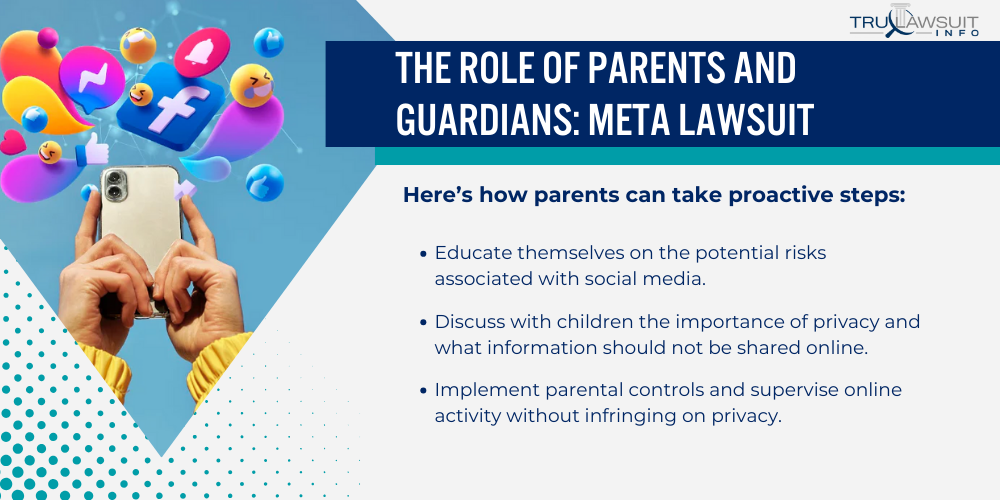
Their involvement is essential in both preventative measures to protect children online and in seeking justice for any harm caused.
Educating for Prevention
In the digital age, children and teens are increasingly exposed to online risks, making it crucial for parents to guide and protect them.
With the vast array of online information and social interactions, understanding these risks is the first step toward prevention.
Ensuring online safety for children and teens begins with education.
Here’s how parents can take proactive steps:
- Educate themselves on the potential risks associated with social media.
- Discuss with children the importance of privacy and what information should not be shared online.
- Implement parental controls and supervise online activity without infringing on privacy.
- Encourage critical thinking about the content they consume on these platforms.
Parents should seek to instill good online habits in their children and provide them with the tools to navigate social media safely.
Seeking Justice and Accountability
When a child is harmed through social media interactions, it becomes imperative for parents to seek justice and accountability.
This journey often involves navigating complex legal landscapes to hold responsible parties, such as social media companies like Meta, accountable for their role in the incident.
When harm has occurred, a parent’s pursuit of legal action demands several key actions:
- Consult with legal professionals who are experienced in handling cases involving social media platforms.
- Gather evidence of harm or negligence, such as instances where parents’ consent was bypassed.
- Participate actively in the legal process, potentially providing testimony about the impact on their child.
- Support their children through the legal process, ensuring they understand what is happening and feel protected.
In cases where Meta is held accountable, it’s often due to persistent efforts by parents and guardians to seek justice and enforce online safety measures for the protection of all children and teens.
Advocacy and Public Policy Measures in the Meta Lawsuit
The legal confrontations with Meta Platforms Inc. have catalyzed extensive advocacy efforts and instigated significant public policy measures aimed at protecting users, especially youth, from potential harm caused by social media platforms.
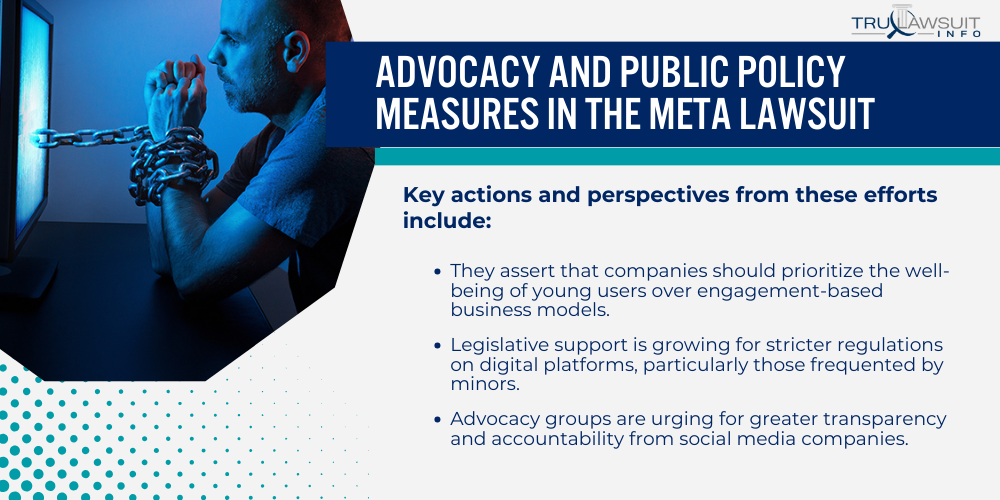
Bipartisan Efforts to Protect Youth
Recent bipartisan coalitions have shown a united front in addressing the youth mental health crisis connected to social media use.
Attorneys general from across various states have joined forces, demonstrating that protecting youth online transcends political divides.
Key actions and perspectives from these efforts include:
- They assert that companies should prioritize the well-being of young users over engagement-based business models.
- Legislative support is growing for stricter regulations on digital platforms, particularly those frequented by minors.
- Advocacy groups are urging for greater transparency and accountability from social media companies.
- The National Center for Health Research is amongst entities that underscore the urgency of understanding and mitigating the risks associated with social media on young minds.
Influencing Federal and State Laws
The legal actions brought against Meta by state lawsuits aim to influence federal law and set precedents for technology companies to acknowledge their impact on mental health.
These developments signal a concerted effort to reform the digital landscape:
- Legislation is being crafted to create safer online environments for children and teenagers.
- State attorneys are lobbying for laws that impose clear guidelines on age-appropriate content.
- Federal efforts include revising existing laws to address modern digital challenges.
- The lawsuits act as a catalyst for a wider conversation on privacy rights and digital well-being.
Meta’s legal challenges illustrate the pivotal role of legal action and policy in shaping safer online spaces for future generations.
Corporate Accountability and Meta Lawsuit Strategies
In the rising tide of legal challenges against Meta Platforms Inc., strategies rooted in corporate accountability are paramount.
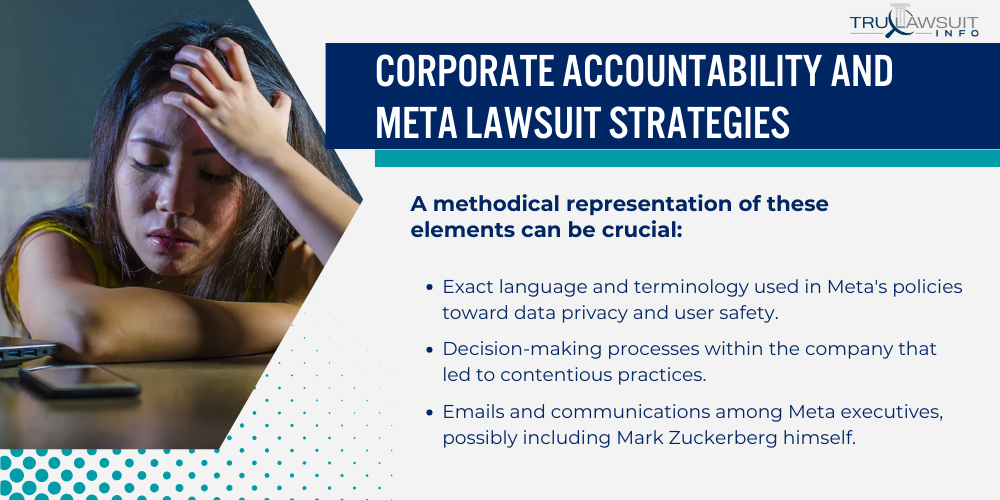
Individuals seeking legal representation against Meta, particularly for cases involving data privacy breaches or exploitative advertising practices, should consider how the company’s transparency and economic motives could impact their lawsuit.
Transparency in Operations
Meta’s approach to transparency has serious implications for legal strategies. With legal and public pressure mounting, Meta executives are often compelled to disclose internal documents that can be pivotal in litigation.
A methodical representation of these elements can be crucial:
- Exact language and terminology used in Meta’s policies toward data privacy and user safety.
- Decision-making processes within the company that led to contentious practices.
- Emails and communications among Meta executives, possibly including Mark Zuckerberg himself.
- Compliance reports with regulatory requirements.
- Risk assessments related to specific features or policies.
- Disclosures in investor reports that acknowledge potential legal liabilities.
These pieces of evidence can help construct a narrative of either due diligence or negligence in Meta’s operational transparency.
Economic Factors at Play
The lawsuit strategies against Meta are also affected by the company’s economic considerations, particularly advertising revenue.
Developing a clear understanding of Meta’s financial drivers offers insight into why certain company decisions were made.
This can include:
- Profit margins are related to specific features that are the subject of the lawsuit.
- Market pressures influence Meta’s policies on data privacy and user engagement.
- Investor expectations and how they align with user safety and data protection measures.
- Financial forecasts predicting the impact of regulatory changes on Meta’s bottom line.
- Cost-benefit analyses that might have weighed the financial implications of safer practices against the risk of lawsuits.
- Advertising sales strategies that tie into user data exploitation and privacy concerns.
These economic factors often highlight the decision-making process behind Meta’s contested practices and can be used to argue for or against the company’s accountability in legal settings.
Potential Consequences and Outcomes of the Meta Lawsuit
The ongoing litigation against Meta could bring significant shifts in regulatory practices affecting social media platforms.
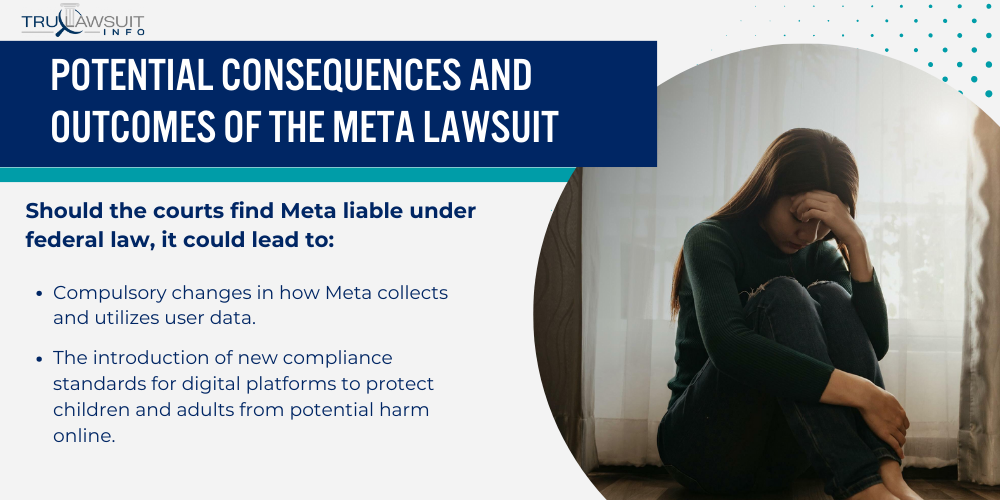
These proceedings might redefine how personal data is handled and provide a precedent for state lawsuits concerning digital privacy.
Impact on Social Media Regulations
The lawsuit against Meta is anticipated to have wide-reaching implications for the regulation of social media.
Should the courts find Meta liable under federal law, it could lead to:
- Compulsory changes in how Meta collects and utilizes user data.
- The introduction of new compliance standards for digital platforms to protect children and adults from potential harm online.
- Increased scrutiny over mergers and acquisitions, especially those that potentially consolidate too much market power.
- The possibility of significant financial penalties, which may discourage similar behavior by other companies.
Meta is currently addressing claims that include creating addictive features for children and undermining data privacy.
Legally, the outcomes of such a large-scale lawsuit might influence the drafting and enforcement of both federal and state laws governing the operation of technology companies.
Subsequent regulations could demand more transparency and user consent in the way personal information is leveraged for profit.
State lawsuits and their findings might also compel social media entities to implement more robust safeguards to protect individuals from the misuse of their personal data.
These landmark decisions have the potential to overhaul the entire landscape of social media regulation, with Meta’s case setting a stringent legal precedent for forthcoming actions.
Frequently Asked Questions
-
Individuals looking to join a class action lawsuit should first verify their eligibility based on the specific case criteria.
They can then seek inclusion by contacting the law firm handling the lawsuit or submitting their details through a designated class action website.
-
When seeking legal representation against Instagram, one should start by researching attorneys with experience in technology law and privacy issues.
Then, it’s important to schedule consultations to discuss the case, followed by a review and selection of the attorney they feel best represents their interests and situation.
-
Eligibility to file a lawsuit against Facebook for emotional distress typically requires proof of actual harm or suffering due to the platform’s actions.
Victims should gather evidence of their distress and consult with a lawyer to determine the validity of their claims.
-
Staying informed about recent developments in social media lawsuits involves regularly checking legal news sites and official court or settlement websites.
It’s also beneficial to follow the updates provided by law firms that specialize in this area of law.
-
Individuals can check the status of a Facebook lawsuit settlement by visiting the settlement administrator’s website, where updates are posted periodically.
They may also contact the administrator or task force directly via phone or email for the most current information.

Attorney Jessie Paluch, founder of TruLawsuit Info, has over 25 years of experience as a personal injury and mass tort attorney, and previously worked as an international tax attorney at Deloitte. Jessie collaborates with attorneys nationwide — enabling her to share reliable, up-to-date legal information with our readers.
Legally Reviewed
This article has been written and reviewed for legal accuracy and clarity by the team of writers and legal experts at TruLawsuit Info and is as accurate as possible. This content should not be taken as legal advice from an attorney. If you would like to learn more about our owner and experienced injury lawyer, Jessie Paluch, you can do so here.
Fact-Checked
TruLawsuit Info does everything possible to make sure the information in this article is up to date and accurate. If you need specific legal advice about your case, contact our team by using the chat on the bottom of this page. This article should not be taken as advice from an attorney.
You can learn more about the Social Media Harm Lawsuit by visiting any of our pages listed below:
Here, at Tru Lawsuit Info, we’re committed to helping victims get the justice they deserve.
To do this, we actively work to connect them with attorneys who are experts in litigating cases similar to theirs.
Table of Contents
Tru Lawsuit Info is a reliable source of information about issues that may affect your health and safety, such as faulty products, data breaches, and environmental hazards.
Our team of experienced writers collaborates with medical professionals, lawyers, and advocates to produce informative articles, guides, and other resources that raise awareness of these topics.
Our thorough research provides consumers with access to reliable information and updates on lawsuits happening around the country. We also can connect consumers with attorneys if they need assistance.
Here, at Tru Lawsuit Info, we’re committed to helping victims get the justice they deserve.
To do this, we actively work to connect them with attorneys who are experts in litigating cases similar to theirs.
